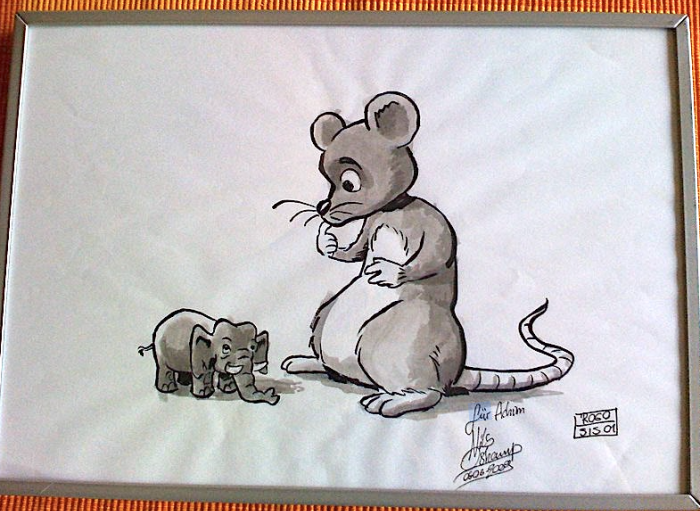We, as humans, are good at making distinctions, but not as good at finding similarities.
But if we recognize our bias, though, we can be good at both.
We are forever sizing ourselves up to others, making comparisons. Sometimes seeing ourselves in a favorable light, other times inferior, perhaps equal, and so forth.
But seldom do we think in terms of similarities when comparing ourselves to others. Especially when we see a dramatic difference in our favor, or conversely, going the other way.
If someone asked us the difference between a mouse and an elephant, we’d feel a bit indignant. The question seems absurd from the start, but the first thing that would come to mind is the obvious difference in size.
Now, if we ask ourselves what the similarities are, and put aside for a moment the obvious difference in size, we’d realize that in the most important matters, the elephant and the mouse are the same.
The most important similarity is without a doubt that both treasure their lives. Though the elephant is vastly larger in size, the mouse loves his life every bit as much as the elephant, and wishes to guard and protect it no less.
The mouse and elephant share the same grey color, but just because the elephant has more of it doesn’t make it any more grey. Disease and sickness effect the mouse and the elephant alike, as do old age and death.
If Mother Nature loves her creatures—as we know she does—we, by default, know that she loves the mouse as much as the elephant. Therefore, both can equally boast of being loved and valued by her.
Both mouse and elephant wish to be admired by their peers. Both love peanuts; although the elephant can eat more, that doesn’t mean he enjoys them more.
It doesn’t take much thought to see that the distinction in size between an elephant and a mouse is dwarfed by the similarities they share. People are the same way. While we notice distinctions among our peers, those distinctions are insignificant when framed by our similarities. Yet, we look with a needle and magnifying glass to find the differences, while discounting obvious similarities. And acknowledging similarities would bring us in accord with the commonalities that, if recognized, would dissolve the alienation so common in our world today.
People struggle in life to distinguish themselves from others and lifetimes pass to this end. Even if distinctions are realized, they are trivial when considered in relationship with what matters. Mother mouse and mother elephant love their offspring and would sacrifice their own lives for them. Both mouse and elephant grow big (proportionately, of course) and put aside their mother’s love as they struggle to keep themselves fed, sheltered, and social. For better or worse, new bonds are created as they struggle to survive; they forget what matters, and get caught up in the rat race (or the elephant race).
Within the rat race, everyone is competing in diverse ways, but from an outside perspective, everyone is doing the same thing. It is a dog-eat-dog world and the more we pile up, the more we want. The more we dominate, the more we want to dominate. The more we grasp, the more we crave.
Is this success? If so, how is it that contentment remains elusive? In fact, is mankind not like a mouse on a treadmill making great advances while in truth going nowhere?
We struggle to distinguish ourselves from others. Even within families, children from an early age compete for attention. At school, peer pressure afflicts even the most stalwart. Schools want to be better than their rivals. Cities compete in athletics, financial influence, industry, and so forth. States do the same, and countries battle for influence and compete for resources, manufacturing, military power, and so forth.
Competition and seeking distinction wouldn’t be a problem were it not for the fact that they take place in a vacuum with nothing to act as a counterbalance. We lose sight of the similarities we share and we forget that life is a game we are all playing. Nothing material should be taken seriously, and certainly nothing is worth fighting over.
Mr. Mouse and Mr. Elephant can get along fine when they respect each other’s needs and see themselves as no different from each other. This should not be an altruistic fantasy. It is the way things really are, if we look at the big picture.
Aside from a scattering of yogis and mystics who see no distinction between self and other, the rest of us often fail at this. We think the mouse is small and the elephant is big, and therefore the two are very different. But tell that to a mouse. The mighty elephant foolish enough to argue his greater importance to the mouse will do no better than the British did against the diminutive Gandhi.
A peaceful world is the goal, and if there is a better way to reach this than seeing the similarities we all share, I don’t know what it is.
~
Please consider Boosting our authors’ articles in their first week to help them win Elephant’s Ecosystem so they can get paid and write more.
~


 Share on bsky
Share on bsky





Read 5 comments and reply